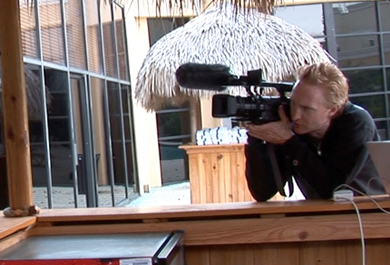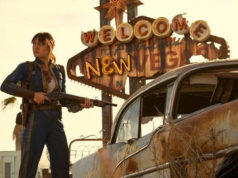Even over the phone, Jay Thames is a massive presence. He has a sandblaster of a voice, and his words come tumbling out with the force of a river rapid as he relates colorful anecdotes — frequently in colorful language — about his itinerant life as an aspiring filmmaker. It’s the voice of someone who’s spent years promoting himself and his movie projects in L.A. and New York City, two of the toughest and most rewarding cities for independent filmmakers. Now at last, this TCU graduate seems poised for at least a modest breakthrough.

Thames was born 37 years ago in the Houston suburb of Kingwood, far enough removed from the gritty core of the Bayou City that he thought of Fort Worth as a big city when he came to TCU in 1990 to study filmmaking. He’d already made hundreds of short films while he was growing up. Or as he puts it, “I was on the ultimate YouTube mission before YouTube existed.” At his parents’ behest, he selected a major in marketing to give himself a professional fallback. “It just didn’t take,” he said. “I just decided, I’m going into filmmaking, safety be damned.” He remembers the school’s program as being more about film theory back then, whereas now it focuses more on the mechanics of making movies.
After graduation (and moving back in with his parents, an experiment that lasted all of one day), he roomed with a friend in New York City. He made ends meet by working as an unlicensed electrician, though he had no training in that craft. Instead he watched others do the job and tried to pick things up. After four years of trying to make films amid a sea of NYU, Columbia, and New School film grads, he moved again, to Los Angeles. There he worked at a specialty shop selling cowboy boots to A-list celebrities. (“When people make it in Hollywood, they all go through a Western phase where they buy a bunch of cowboy shit,” said Thames.) Getting his ideas heard was just as arduous in California, and even though he met the likes of Arnold Schwarzenegger at the store, he never used his sales position to pitch his projects. “I didn’t want to be the guy at the boot store hawking his script,” said Thames. “I wanted to talk to all those people as a colleague, on an equal footing.”
Though Thames wrote plays and occasionally tried out material with others in his acting class, a documentary subject gave him his start as a filmmaker. A friend from New York, Mike Rooney, told him about his passion for racing radio-controlled miniature cars on indoor courses and the people who pursued that as a professional sport. Rooney offered to fly Thames to Orlando in December 2007 to document the Snowbird Nationals, one of the sport’s key races. Thames wound up spending a year filming races and interviewing competitors, getting footage for his film Carpet Racers. “I didn’t intend to spend a year,” he said. “Some of these racers just aren’t very forthcoming. I’d wind up sitting there waiting and hoping that they’d forget the camera was there.” Funded solely through Rooney’s production company, the documentary has played at several festivals, winning an award at the Honolulu International Film Festival and receiving a premiere in Fort Worth last April. Distribution is now being negotiated.
Thames can be found onscreen as well. He had no acting ambitions when he started out, but while working in the building that housed VH1 in New York he was offered a chance to do voiceovers. Now he’s a working actor — most recently he portrayed a band roadie in The Runaways whose sexist taunts earn him a shove from Kristen Stewart’s Joan Jett. “I was playing a biker on [the TV drama] Sons of Anarchy, and my hair was really long, so I guess I looked authentic for the period,” Thames remembered. “Kristen’s a sweetheart. She really committed to getting down and dirty for that role.”
Now his first fiction feature, a crime drama entitled The Power of Few, told from different points of view, is set to roll in New Orleans later this summer. He also has a thriller in mind that he’d like to film in central Texas’ backwoods. He touts the value of persistence and preparation when heading into a project, but he knows the importance of other things as well. “If you have stories and want to tell them as a career, there are few things more rewarding than seeing them on the screen,” he said. “We need passionate filmmakers.”











